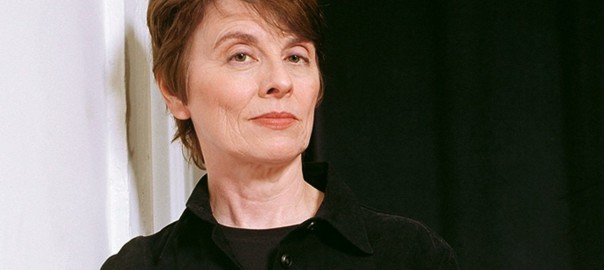August 9, 2016
Camille Paglia is an intellectual flamethrower. She’s fearless. She can be bully-mean and a name caller. She makes some people really, really mad. But she’s also a serious thinker who has been able to write important scholarly books that cross over into a wide readership, and you can regularly find her byline in national magazines, where it’s always a treat to read her sentences.Whether she’s writing about the Obama administration, characterizing cats (in Sexual Personae) as the “autocrats of self-interest,” rhapsodizing about The Real Housewives, or bludgeoning feminists, Christopher Hitchens, or Jon Stewart, she is sometimes right and never boring.
I approached her for this series with trepidation. I was eager to hear what she had to say about writing, but, to be honest, I was a little afraid of her (she called my former boss, Stanley Fish, a “totalitarian Tinkerbell”). Silly me. Camille could not have been more gracious, personable, or fun. She did tell me with a bit of glee that my former employer, Oxford University Press, was one of the seven publishers who rejectedSexual Personae. Thankfully that was before I started working there.
Do you think of yourself primarily as a writer?
Paglia: Yes, I do, and that is how I am mainly known outside the U.S. From college on, my ambition was to establish the legitimacy of the genre now widely accepted as creative nonfiction.
How did you learn to write?
Like a medieval monk, I laboriously copied out passages that I admired from books and articles — I filled notebooks like that in college. And I made word lists to study later. Old-style bound dictionaries contained intricate etymologies that proved crucial to my mastery of English, one of the world’s richest languages.
What have you done that has helped you reach an audience beyond academe? Did that involve unlearning things from grad school?
Paglia: Good Lord, I certainly learned nothing about writing from grad school! My teacher was Yale’s Sterling Library, that Gothic cathedral of scholarship. I was very drawn to the lucid simplicity of British classicists of the late 19th and early 20th centuries, where one could hear a distinct speaking voice.
In my final years of grad school in the early 1970s, French poststructuralism was flooding into Yale, and I was appalled at its willful obscurantism and solipsism. After a talk by some preening Continental mandarin, I complained to a fellow student, “They’re like high priests murmuring to each other.” I deeply admire French literature, but that poststructuralist swerve was one of the stupidest and most disastrous things that American humanities departments ever did to themselves or to the great works of art that were in their custody. It was mass suicide, and the elite schools are now littered with rotting corpses.
How do you think about crafting your literary persona/e? What choices do you make when you’re thinking about that?
Paglia: I was very influenced by American colloquial speech and slang. My mother and all four of my grandparents were born in Italy, so English was a relatively recent acquisition for my family — brash and dynamic. I adored the punchy, pugnacious sound of American media — Ann Landers’s column in the newspaper (“Wake up and smell the coffee!”) or the raucous chatter of 1950s disc jockeys.
Like Andy Warhol, another product of immigrant culture, I was fascinated by the bold crassness and rhetorical hyperbole of American advertising and comic strips, with their exploding exclamation points. I still listen constantly to radio, at home or in the car — it’s a central influence, especially sports shows where you hear working-class callers going off on hilarious tirades.
For scholarly essays, I erase myself as much as possible, but my default literary persona — the one people instantly recognize — is a barking, taunting, self-assertive American voice.
Is there anything you’re afraid of, or that you struggle with (when it comes to writing)?
Paglia: Yes, the actual writing! My system of composition has four parts. There’s a long period of very enjoyable rumination, where I assemble information and jot ideas and phrases at random on legal-size notepaper — pages upon pages. Then as the deadline approaches, I study my notes and bracket or underline principal themes in colored ink to map out a skeletal general outline. Third comes the dreaded moment of writing — which is total torture! It’s a terrible strain, and I’m literally tied up in knots of anxiety as I toil over it. Once a draft is blessedly complete, my fourth stage of reviewing and tweaking the text (which can go on for days, if there’s time) is pure, serene pleasure — there’s nothing I love more!
I must stress that all of my important writing, including my books, has been done in longhand, in the old, predigital way. I absolutely must have physical, muscular contact with pen and page. Body rhythm is fundamental to my best work. I may write interviews and columns for the web directly on the computer, but nothing else.
What is your process for revision?
Paglia: After every few scribbled pages, I trek to the computer and type it all up, so that I can see what the text will look like to the reader. My later tweaking is always done on printed-out text.
But my sole revisions are stylistic. My preparation for writing is so slow and extensive that I never revise per se, as others might understand it. For example, perhaps only twice in my entire career have I changed the position of a paragraph. The consecutive logic of my blocklike paragraphs (as in Roman road-building) is always resolved at the outline stage, before I ever sit down to write. Revision for me is essentially condensation — that’s where the Paglia voice suddenly emerges. By subtracting words, I force compression and speed on the text. Through long practice, I’ve achieved a distinct flow to my writing — a compulsive readability, even when the reader hates what I’m saying!
I learned condensation from two principal sources: the impudent, crisply written Timemagazine of my childhood and the epigrams of Oscar Wilde, which I discovered collected in a secondhand book when I was an adolescent in Syracuse. My Wilde-inspired ability to strike off sharp one-liners was a major reason for my rise to national visibility in the 1990s. For example, when Time contacted me at deadline for comment on its Viagra cover story in 1998, I replied within minutes, “The erection is the last gasp of modern manhood.” Any compendium of contemporary quotes usually has a ton of mine.
In addition to condensation, I also employ syncopation, modeled on the jazz-inflected Beat poetry that had a huge impact on me in college. When people try to parody my prose, this is what they miss — those subtle, jagged twists, turns, and tugs, whose ultimate source is music. In short, the secret of my writing is focus, planning, persistence, labor, and attention to detail.
Your thoughts on academic prose. Who are the academics whose style you love?
Paglia: Cue the laugh track! What’s to love in any living academic’s style? You’d have to go all the way back to Jane Harrison, C.M. Bowra, and Rhys Carpenter to find an academic style I cherish. I’ve spent 25 years denouncing the bloated, pretentious prose spawned by poststructuralism. Enough said! Let the pigs roll in their own swill.


